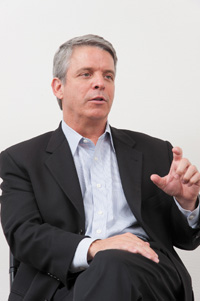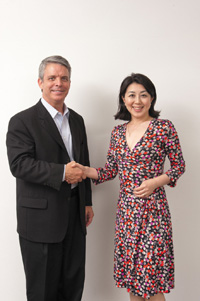 |
|||
|
|
|||
|
View from the Top Vol. 11, No. 9, pp. 1–4, Sept. 2013. https://doi.org/10.53829/ntr201309tp1  Setting Numerical Targets Provides a Foundation for Fostering Talent and Providing Our Clients with High Quality ServicesOverviewNTT DATA, Inc., founded in 2012, under the Global One NTT DATA system, provides a wide range of IT services focused on the North American market from its base in the United States. Its business endeavors include application development and support, business-process outsourcing, cloud services and staffing for a broad set of industries including financial services and insurance, manufacturing, life sciences and healthcare, and the public sector including federal, state, and local governments. We asked CEO John McCain to tell us about the objectives he has set for the company during his tenure, his specific strategies to generate profits and invest in human resources, and his core beliefs as head of NTT DATA, Inc. Working toward greater brand recognition and revenue growth—Mr. McCain, can you tell us about your management strategies and objectives as CEO? Our business objective is to achieve profitable revenue growth. At present, our annual revenue in North America is about $1.4 billion dollars, but our long-term aspiration for NTT DATA [1] in this market is to be a top 10 provider with revenue closer to $5 billion dollars. To support our business, we employ about 18,000 professionals, 10,000 of whom live in India and work on our global delivery team. The other 8,000 reside in the United States and Canada. Globally, I believe that NTT DATA can provide a level of quality, innovation, and customer service that no other information technology (IT) service provider can match. While we have a very nice presence in the U.S., the NTT DATA brand is still relatively unknown. So we are cooperating closely with our corporate headquarters and the marketing group in particular to implement programs that strengthen the NTT DATA brand in the marketplace. The U.S. economy is coming back, and I would like NTT DATA to grow with it and to be stronger than our competitors. Based on present conditions, and in line with NTT DATA’s Medium-Term Management Plan, our objective is to achieve revenue growth of 10% over the next few years. This steady growth and continued targeted acquisitions will help us meet our objective to become one of the top five global IT service providers.
Investing in the global market requires awareness, resolution, and preparation centered-around “trust”—How would your expansion strategies differ between the U.S. and global markets? I would say that they differ in terms of portfolio focus. Strategy must depend on the characteristics, needs, and target industries of the continent or region in question. The technologies and skill sets that we can provide will also differ from region to region. In Japan, for example, there is a higher demand for traditional outsourcing, that is, for the on-shore, in-country provision of services in combination with longer-term, larger-scale contracts. In the United States where delivery of technologies and services from off-shore, overseas sources is common, our contracts are often more tightly scoped, short to medium term projects––more like a managed services model. The fact that NTT DATA can adeptly deliver both of these models gives us the best of both worlds that independent companies cannot produce simply through collaboration. In this regard, Keane, the company that I used to belong to, entered the global market by forming partnerships, but it never achieved a scale of the likes of NTT DATA. Becoming a member of the NTT DATA Group has enabled us to participate in the global market as a member of the 6th largest IT company in the world. This association enhances our level of credibility with our customers, and we feel that having access to NTT DATA and NTT Group services is a very valuable asset. As we collaborate more, we will be able to provide a wealth of services that would not be possible as a single company. —There are many outstanding IT companies in the world. Why did you choose the NTT DATA Group? Yes, we had choices! But, several years ago, we started a “courtship” with NTT and got to know each other along the way. And the more we learned about each other’s culture and values, the more we thought about working together. I would sum up our common culture in one word: “trust.” Building a relationship in which each company brings its individual strengths to the table is important because that process can empower each other. So when the NTT DATA Group presented an offer to acquire Keane, it was very natural for us to proceed with talks toward becoming a member of the group. We also felt that what we could contribute to NTT DATA would be very valuable. Keane maintained a very big customer base in the United States as well as an excellent off-shore delivery capability, which we felt would fit well with NTT DATA’s efforts in rounding out its global portfolio. I don’t think it’s possible to build a trustworthy relationship with just any company. NTT DATA is a very mature company having been a global business for some time. They are resolute and prepared to invest in the global market, and I believe this strong desire to expand is important as it relates to all types of business development.
Healthy competition within the company raises client satisfaction—In light of the above, let me ask you again: What do you think is NTT DATA, Inc.’s most important core value? As a company, I believe leadership is of primary importance. With good leadership, the business can become stronger and even better services can be provided. NTT DATA, Inc. is a high-energy and “fun” company to work at, with employees who are driven and results-focused. Additionally, as senior leaders driving from the top, we employ a model featuring a certain amount of transparency and a fair bit of competitiveness to get the best performance out of everyone. For example, we hold a senior-leader telephone conference monthly with the top 150 leaders of the company to review monthly results. Here, we have a scorecard that ranks each unit with the manager’s name from best to worst in terms of revenue growth and profit performance. The results of this scorecard are presented for everyone to see. By comparing everyone’s results in this way, each leader can learn where he or she stands in comparison with his or her colleagues and can learn the methods and tactics of those achieving superior results. This approach invokes a competitive in-house spirit; it can motivate people to do well and produce good results for their team and the company. Employees who produce good results can, of course, be well remunerated, but they can also experience personal satisfaction when their efforts pay off. This healthy competition can motivate individuals to improve their performance; if they are currently ranked at the bottom, it can drive them to work hard on a daily basis to improve their business unit. In the end, I believe this competitive spirit is directly related to improving client satisfaction. —What is most important to you in your role as CEO? Well, it’s difficult to narrow that down to one thing, but I think that I’m very focused on determining how to get each team to best deliver its financial commitments to the company. “Making our numbers” is the foundation for doing all the other things that we need to do. If we deliver on our commitments, we can invest in our people and in new products and services. It gives the company vitality to do what it needs to do in terms of projects, products, and reengineering. As CEO, it’s important that I make sure that we have the right leaders in charge of the right businesses, and that I strive to develop and grow them. I am always focused on developing talent and on providing effective human-resource programs. And this is not limited to individuals—I look to develop the abilities of entire teams as well. The ranking system using scorecards that I mentioned earlier is one example of how I approach talent management. In addition, I have made wonderful friends and have had fabulous mentors throughout the course of my long career, and through them, I have learned the value of trust and respect in business. In particular, Mani Subramanian, the former chairman of Keane International, Inc. was a man of great virtue and courage who was willing to take risks. I learned much through my interaction with him.
Striking a healthy balance between your business persona and private life—Mr. McCain, can you leave us with a message for all NTT DATA, Inc. employees? Of course. Let me first touch upon my style of time management as a business person. Time is very precious to me, and in the end, it’s all about efficiency. That’s the way it has always been for me. I am very diligent with starting and stopping the day on time, and avoiding long, drawn out meetings. I think it’s really important to protect the quality of life, so I manage my calendar very well. I don’t think life is only about work. Of course, there are times when you are swamped with work, but as a business person, I think it’s important that you maintain a healthy work/life balance. The life of your spouse and children are also important as you move through life. I like to work hard and fast while I’m at work but I also like to relax away from work. It’s important to be able to take time off, to turn your business life on and off. It’s a very exciting time for all of us. We are all blessed with astonishingly talented colleagues and leaders and superior clients. We must not forget that we are the “face” of NTT DATA. We must always have our customers’ success in mind and perform high-quality work as a united team. Our opportunities are limitless! Reference
Interviewee profileCareer highlightsJohn McCain joined Electronic Data Systems in 1986, rising up to Executive Officer and Senior Vice President. He then served as CEO of Capgemini North America from 2003, Senior Vice President and General Manager at Hewlett-Packard from 2006, and President and CEO of Keane from 2009. He took up his present positions as an Executive Officer of NTT DATA Corporation and CEO of NTT DATA, Inc. (North America) in 2012. |
|||











